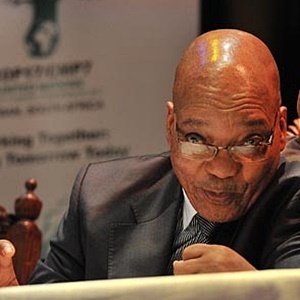
Former president Jacob Zuma. (GCIS)
Multimedia · User Galleries · News in Pictures Send us your pictures · Send us your stories

Former president Jacob Zuma. (GCIS)
Multimedia · User Galleries · News in Pictures Send us your pictures · Send us your stories

Jacob Zuma once remarked that the South African state which consisted of the executive, judiciary and Parliament, was not captured during his presidency.
To capture the state, he said, you would have to capture all three pillars. But he never said which one or two according to him was captured.
His understanding – or should I say lack of – the state was shocking for a "head of state". One could not help but interpret his remarks as implying that neither the judiciary nor Parliament was captured.
He seemed to tacitly admit the executive had been. Now that he will soon have an opportunity to explain himself in a public commission of inquiry he was directed to set up, we need not speculate about how he will go about doing it.
But his understanding of the state was very limited indeed. The state is not only about the three pillars. It consists of the whole body of rules, regulations, laws, assets, processes, systems and legitimate internal cultural practices among others.
All of these are sanctioned by the Constitution – itself a foundation of the state that gives effect to the existence of the executive, Parliament and judiciary as well as the professional bureaucracy and all the other things mentioned above. Violating any of these in effect amounts to tearing the Constitution itself apart.
Capturing a functionary of state like a president, minister or bureaucrat on its own doesn’t yield any benefit if the captured does not violate the rules, systems, processes, property, systems and other elements of the state. Unless the captured bends certain rules, processes and practices of the state for his or her own benefit.
In the crudest form, it could involve direct theft of state assets such as cash (Estina dairy farm), intellectual property (Denel) and information (Faith Muthambi Cabinet leaks), to name just a few, for the benefit of the capturer.
Those who have been captured and their supporters are complaining that the inquiry headed by Justice Raymond Zondo is too narrowly focused and should be expanded to investigate pre-1994 state capture. The fact that such comments are self-serving doesn’t mean that we should leave them to attain some semblance of legitimacy.
Here are reasons why such comments should be thoroughly discredited. First, there is no point in investigating whether there was state capture in the previous nondemocratic regimes. The colonial and apartheid states were illegitimate. How would investigating the relationship Alois Nellmapius had with Transvaal president Paul Kruger help South Africa in the twenty-first century?
Or even going back to the 16th century, how will investigating the fact that the Dutch East India Company’s executives fulfilled the role of Parliament, executive and judiciary all at the same time help us now? Of course, these things are recorded in history books and that’s why we know about them.
Secondly, 1994 marked the birth of a new South Africa and a state that South Africans of all racial backgrounds could call legitimate. If South Africa were to be attacked by an external enemy, these South Africans of all backgrounds will fight together as equal citizens to defend it. Underpinning the new South Africa is a Constitution that has a bill of rights. These rights are inclusive of political rights including the right to elect a government that will be accountable to all citizens as prescribed by the Constitution itself.
When this arrangement is threatened by those who interrupt the chain of accountability through state capture, the very essence of constitutional democracy is threatened. And the political rights of citizens can no longer be guaranteed. Faced with such threats, citizens must stand up and fight. The state capture inquiry is a culmination of the actions of determined citizens to defend the constitutional and legitimate state so that it is not repurposed to serve private interests.
Thirdly, there is a populist view that white-owned companies have enjoyed monopoly over certain contracts with state-owned companies. The Guptas were being targeted because they dared to upset those arrangements. Therefore, the argument of the pro-Zuma camp goes, these arrangements have to be investigated because they amount to state capture.
This view is naive. Historically, the South African state privileged white people. That’s a historical fact. The point about 1994 was not about sending white people to the sea. It was about transforming the economy so that the previously disadvantaged could also participate meaningfully in a growing and inclusive economy.
This was to be done in an orderly, legislated and constitutionally sanctioned process. These legislated transformative measures were confirmed by the Constitutional Court when it ruled against the multibillion rand CPS social grant contract because the company had no black economic empowerment credentials.
The vocal political spokespersons of radical economic transformation doggedly defended the contract in the same way they did Guptas who scored lucrative deals in state-owned companies at the expense of South Africans. Investigating state capture will hopefully rescue the transformation from the controversy and restore its ethical and constitutional imperative.
The last thing South Africans, whether black or white, needed was to be lectured by the likes of Guptas and Bell Pottinger on how to deal with our internal transformation challenges. Sadly, the captured among our political elites thought it was a wise move.
- Mkhabela is a political analyst with the Department of Political Sciences at the University of South Africa.
Disclaimer: News24 encourages freedom of speech and the expression of diverse views. The views of columnists published on News24 are therefore their own and do not necessarily represent the views of News24.